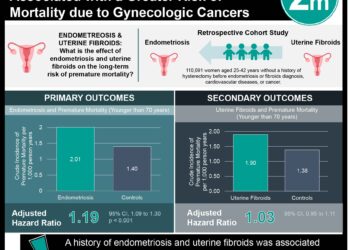Perioperative protocol shortens stay after major gynecologic surgery
Image: PD
1. An enhanced recovery protocol was associated with shortened hospital stays and reduced costs among patients undergoing major gynecologic surgeries (cytoreduction, surgical staging, or pelvic organ prolapse surgery).
2. Enhanced recovery protocols were associated with decreased use of patient-controlled anesthesia.
Evidence Rating Level: 2 (Good)
Study Rundown: This study found that among women undergoing major gynecologic surgeries (cytoreduction, surgical staging, or pelvic organ prolapse surgery), institution of an enhanced recovery protocol resulted in improved post-operative outcomes (shorter duration of stay, substantial cost-savings and no significant differences in post-operative complications). Past studies assessing enhanced recovery protocols have shown similar benefits in patients undergoing other operations, but limited evidence has previously been available to support its application in gynecologic surgery.
Strengths of this study include a larger sample size than prior studies and the use of recent historical controls matched by procedure type from the antecedent year. Limitations include retrospective design, limited power, and multimodal intervention. Futures studies should evaluate the use of enhanced recovery in gynecologic surgery in a randomized controlled trial with larger sample size, and in a wider variety of gynecologic surgeries, including minimally invasive procedures.
Click to read the study in Obstetrics & Gynecology
Relevant Reading: Enhanced recovery pathways optimize health outcomes and resource utilization: A meta-analysis of randomized controlled trials in colorectal surgery
In-Depth [retrospective cohort study]: This study assessed the impact of an enhanced recovery pathway in patients undergoing cytoreduction, surgical staging or pelvic organ prolapse surgery. The enhanced recovery pathway includes preoperative patient education, reduced preoperative fasting, omission of bowel preparation, multimodal analgesia, early mobilization, prokinetics and early enteral nutrition. Data was abstracted from electronic medical records of 241 case patients treated per the recovery pathway (81 cytoreduction, 84 staging, 76 vaginal) from June through December 2011 and 235 historical controls (78 cytoreduction, 80 staging, 77 vaginal) from March through December 2010. The primary outcome assessed was length of hospital stay; secondary outcomes included morbidity, cost and patient satisfaction.
Overall, patients on the enhanced recovery pathway were discharged sooner (4 days in cytoreduction cases) and resulted in reduced costs ($7,600 cost-savings per cytoreduction case). Similar results were seen in patients following surgical staging and pelvic organ prolapse surgeries. Fewer case patients used patient-controlled analgesia compared to historical controls (33% vs. 98.7%), though nausea (55.6% vs. 38.5%) and vomiting (17.3% vs. 2.6%) were more likely. Patient satisfaction was high in patients on the enhanced recovery pathway, with 90-99% of them rating satisfaction as excellent or very good.
By Denise Pong, MPH and Leah Hawkins, MD, MPH
More from this author: Severe endometriosis associated with poor IVF outcomes, New guidelines for intrapartum management of patients with mental disorders, Oral glucose tolerance test preferred for pre-diabetes screening in PCOS
© 2013 2minutemedicine.com. All rights reserved. No works may be reproduced without written consent from 2minutemedicine.com. Disclaimer: We present factual information directly from peer reviewed medical journals. No post should be construed as medical advice and is not intended as such by the authors or by 2minutemedicine.com. PLEASE SEE A HEALTHCARE PROVIDER IN YOUR AREA IF YOU SEEK MEDICAL ADVICE OF ANY SORT. Content is produced in accordance with fair use copyrights solely and strictly for the purpose of teaching, news and criticism. No benefit, monetary or otherwise, is realized by any participants or the owner of this domain.







